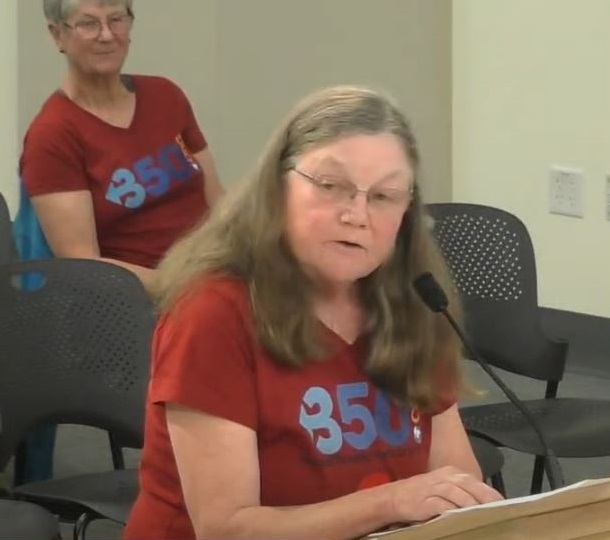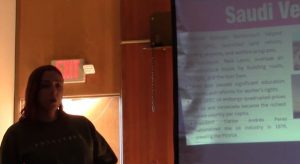Earth Day 2024: Actuaries consider losing half of worldwide GDP to climate change
9 min read
The Eugene City Council hears public comment on April 22, Earth Day.
Debra McGee: My name is Debra McGee. I’ve lived about 10 miles outside of Eugene for 40 years.
Genocide, nuclear threats, wars, and pollution,
Income inequality, racism, poverty, addiction, homelessness, they all need solutions.
However, the one thing overriding all these issues,
It’s the carbon in the atmosphere that’s heating up our tissues.
So you passed a resolution mitigating risks of methane gas
And now staff is working hard to find that path
To clean safe energy,
You know we all need it: Geothermal, wind, solar wave, clean energy synergy.
(Bill McKibben, teacher, 350 co-founder, said it so well).
We’re an experiment, here’s the final test. We got great big brains,
But how we live, modernity, is driving us insane.
So whatever direction you choose for us to go,
We want you to know.
We want you to be even bolder, and you should
Go faster and farther than you ever thought you could,
Because the hour is late
It’s 1.2 degrees hotter, but that doesn’t seal our fate.
We still have a chance. It’s a roll of the dice,
And who will pay the price?
Folks of color, the vulnerable, the young, the old.
Really, what’s the reason? Same old, same old, the pursuit of gold.
Dollar bill, y’all, dollar bill, the golden calf.
If it wasn’t so horrific, it would make you laugh.
Allowed to poison people and planet at will,
It really is a bitter pill.
Regulators captured, saying there’s a need,
But we all know we’re being poisoned for corporate greed.
NW fracked methane gas saying we have to have their poison power.
But I feel the day is coming, I feel the hour.
People gonna rise up like a mighty wave.
No more tax subsidies, no more poison, so our children we will save.
Mayor, city councilors of 2024, you are the leaders we’ve been waiting for.
We expect a lot from you, but we need even more.
Because the one single thing overriding all these issues
It’s the carbon in the atmosphere heating up our tissues…
[00:02:16] Linda Kelley: My name is Linda Kelley and I’d like to quote an excerpt from a book called Not Too Late.
[00:02:22] ‘It is late. We are in a deep emergency, but it’s not too late because the emergency is not over. The longer we wait to act, the more limited are our options. Scientists tell us that there are good options and great urgency to embrace them while we can.’ That’s the quote.
[00:02:43] An emergency has within itself the word ’emerge.’ As applied to our energy future, a crucial piece in stabilizing our climate means our future will be without fossil fuels empowered by electricity.
Two articles I read this week highlight this need. The first was in the Register-Guard, labeled, “Feds propose transit options for spent nuclear fuel.” The bottom line is, after years of assessing what is safest, they cannot find any state that will take it. A Washington Post survey showed what people believe makes the most difference in personal choices. Opinions varied. However, one conclusion was, and I quote, “The most important thing anybody can do is to vote for a climate-friendly government agenda.”
[00:03:31] There are exciting options emerging. Grid-enhanced technology and carbon fiber conduit to replace older steel and transformers and distribution lines will greatly increase electrical capacity quickly. Please listen to the Volts podcast. I don’t know if anybody, have you listened to those, but on Jan. 31, 2024 is really crucial and very interesting developments happening.
[00:04:03] Enhanced geothermal energy is quickly becoming the safe clean energy base load of the future. Basically the sun beneath our feet, the one that doesn’t set.
[00:04:14] It can be used as direct ground source heat and as electricity. It is being employed both in neighborhoods and larger commercial and government buildings in a number of cities.
[00:04:25] I encourage you to be an important part of the solutions. We can act locally. Changing times take courage. There are always the fear-driven backward-looking voices.
[00:04:36] Peter Dragovich: My name is Peter Dragovich. The economic costs of global warming are accelerating. The Institute of Actuaries based in the UK assesses risks faced by pension funds and insurance companies. On climate change, they say, quote, ‘At what point do we expect 50% gross domestic product destruction somewhere between 2070 and 2090?‘ That is not an upper-end estimate.
[00:05:02] They expect a worldwide destruction, their word, of GDP from climate change if we stay on our current course, the three-degree world, by 2070. A 50% loss of GDP compares to 27% in the Great Depression, 5% in the 2008 recession, and 4% during COVID. 2070 is not that far away. Many Eugene residents now in their 20s will still be working in 2070—or not.
[00:05:26] A 50% GDP loss is similar to other reports. Cambridge Econometrics and Ortec Finance state that a portfolio of 60% global equities and 40% bonds will lose 40% in value in a climate change failed transition scenario, a four-degree world by 2100.
[00:05:45] Morgan Stanley reports that nearly half of worldwide wheat, rice, and maize production are in areas at risk of climate change disasters. Food prices are now rising up to 3.2% per year solely from climate change.
[00:05:55] State Farm Insurance announced last week they will not renew existing policies for 30,000 homes in wooded hillside areas in the Bay Area. They stopped issuing new policies and raised rates 20% in that state last year, due in part to climate risk. In Oregon, Natural Resource Economics reports costs of climate change statewide will reach $27 billion per year, including food costs, loss of income, wildfires, health issues, and salmon decline, or $17,000 per Oregon household.
[00:06:30] Transportation, the electric grid, and buildings all need to be decarbonized quickly. Of those three, you have the most direct responsibility for and ability to act on buildings. Please do everything you can to eliminate fossil fuels in buildings. Thank you for your time.
[00:06:49] Jim Neu: I’m Jim Neu. This past January, a four-day ice storm settled over the Willamette Valley, causing widespread power outages, preventing mobility, hampering rescue efforts, and exemplifying the power Mother Nature has in shaping our lives.
[00:07:02] Events like this should be used as a learning tool in determining resiliency in our power generating system. Locally-generated energy through multisource rooftop and community solar systems with battery storage coupled with microgrid technology would keep power energized to participating neighborhood communities.
[00:07:20] During the storm, my PV system with battery storage provided power to my home. Locally distributed renewable energy keeps power generation near the point of consumption, increasing odds against outages and reduced transmission losses. Smart grid technology can detect and respond to outages more efficiently and increases resiliency in the distribution system.
[00:07:43] Virtual power plant systems incorporate solar arrays with battery storage, EV battery, and smart thermostats in maintaining resource adequacy. The Inflation Reduction Act provides funding to develop and expand publicly-owned renewable energy generation.
[00:07:59] Municipalities and local utilities should work collaboratively with the public industry and commercial businesses, community partners, and organized labor groups to develop and implement renewable energy products.
[00:08:12] Renewable energy emergency hubs should be established in the city and county that do not rely on extended use of diesel generators. Priority sites would be the Eugene Airport as part of the new terminal expansion plan and the new YMCA. Both rooftops with solar and battery storage could power the terminal and the new EWEB well in South Amazon Park, and this could be implemented at other well locations.
[00:08:38] Locally-generated renewable energy systems with microgrid capabilities may be the remedy in the next big weather event to keep electricity flowing to its customer base. The latest ice storm demonstrated we don’t have time to waste.
[00:08:51] Patty Hine: My name is Patty Hine. I live in the county and I volunteer with 350 Eugene.
[00:08:56] Thank you for the opportunity to address you tonight. Happy Earth Day. I’m here tonight to thank you for your work on our city’s climate action plan goals and to commend you on your progress. Now I’m urging you to move quickly this spring and summer to bring back a legally-defensible ordinance that will limit unhealthy levels of air pollution in our homes.
[00:09:15] I heard it suggested that the problem of air pollution in homes from fossil gas is a small problem. Why don’t we reduce pollution from transportation since that sector represents greater emissions?
[00:09:28] But ensuring our buildings, especially our homes, are safe places for families to live and breathe, it’s a perfect place to start. Transportation policy is mainly set at the state and federal levels, while cities may use building codes and regulations to ensure our safety. We don’t have to do it alone. There’s substantial new money coming from federal and state bills representing funding for the most significant carbon pollution reductions in the history of America.
[00:09:55] Earlier this month, the U.S. Department of Energy published its first comprehensive federal strategy to reduce emissions in buildings by 90%, projecting reductions that will save consumers more than $100 billion in annual energy costs and avoid $17 million in annual health costs through building upgrades, efficient electrification, and smart controls. The time is now. Climate impacts are real and they’re local. As you know, people are already paying higher bills for air conditioning because it’s hotter, sometimes very hot.
[00:10:31] There will be days when we can’t go outside due to fires and smoke and food prices are rising because of drought. Solid clean renewable energy alternatives are advancing rapidly across the country and the transition to efficient electric heating, cooling, and water heating has the support of major market players and manufacturers.
[00:10:50] Cities and states can and should create a positive business environment by making pragmatic understandable enforceable policy to limit residential sources of pollution, especially those that are hidden. Building electrification promises to deliver widespread health benefits, particularly in communities with high levels of pollution.
[00:11:13] Buck Olen: My name is Buck Olen. And I’m an ardent supporter of all action we can take to mitigate the effects of climate change while building resiliency and sustainability within our community.
[00:11:23] In doing so, we can set an example for communities throughout Oregon and the world at large. The clarity of vision Council showed in recognition of the dire situation facing global ecosystems and humanity’s sustainability by passing Oregon’s first-in-the-state electrification ordinance is an absolute necessity.
[00:11:44] I believe you share my frustration over the Ninth Circuit Court’s misguided legal ruling in Berkeley, which forced the electrification ordinance to be repealed. Nonetheless, I’m confident that Council will remain steadfast in their resolve, moving with all expediency towards an alternative that will withstand legal scrutiny.
[00:12:06] I will not recount examples of the various pathways that have been successfully utilized by communities like Ashland to require electrification, as I know Council is well informed on these details.
[00:12:18] I will, however, urge you to value the lessons learned from the initial and failed attempt at passing an electrification ordinance, in doing so avoiding future setbacks that further expose our community and specifically the most vulnerable among us, to the toxic and life-threatening effects of fossil fuel dependency.
[00:12:40] To remain an influential leader in the electrification movement, we need to demonstrate our capacity for resilience and determination in the face of adversity and failure. We can do this by taking meaningful and direct action to protect our climate and public health, and I respectfully demand that you do so at the June electrification work session.
[00:13:04] Tomoko Sekiguchi: Happy Earth Day. My name is Tomoko Sekiguchi and I’m retired from the University of Oregon where I wrote software to evaluate energy loss and gain in buildings. I want to express appreciation for the leadership you’ve demonstrated by passing Oregon’s groundbreaking electrification ordinance. Your commitment to environmental stewardship and sustainability is commendable.
[00:13:29] However, recent challenges, particularly the Ninth Circuit Court ruling in Berkeley, have hindered our progress. And I thought that that you’re going to have an electrification session in June, and I hope that that is being scheduled, yes? Okay, great, and I urge swift action to electrify Eugene’s homes and buildings. Delay denies us benefits like climate resilience, public health, and economic vitality outlined in our climate recovery ordinance. There are legally defensible pathways to electrification as affirmed by legal experts.
[00:14:08] Options such as building performance standards, restricting new gas piping in right of ways and implementing a carbon charge offers viable solutions. It’s crucial to acknowledge the detrimental role of NW Natural in obstructing climate policy, from suing to repeal climate protection plans to funding anti-electrification ordinance campaigns, NW Natural’s actions undermine our effort towards sustainability and solutions like renewable natural gas and green hydrogen are distractions from the urgent need to transition to clean renewable energy sources.
[00:14:46] Gas stoves pose health risks of emitting pollutants comparable to second-hand smoke and contributing to childhood asthma. These risks underscore the importance of prioritizing electrification for the well-being of our community.
[00:15:08] Patty Hine: Happy Earth Day.
[00:15:09] Tomoko Sekiguchi: Happy Earth Day.
[00:15:10] Councilor Matt Keating: Happy Earth Day.
[00:15:11] Mayor Lucy Vinis: Happy Earth Day, everyone.







